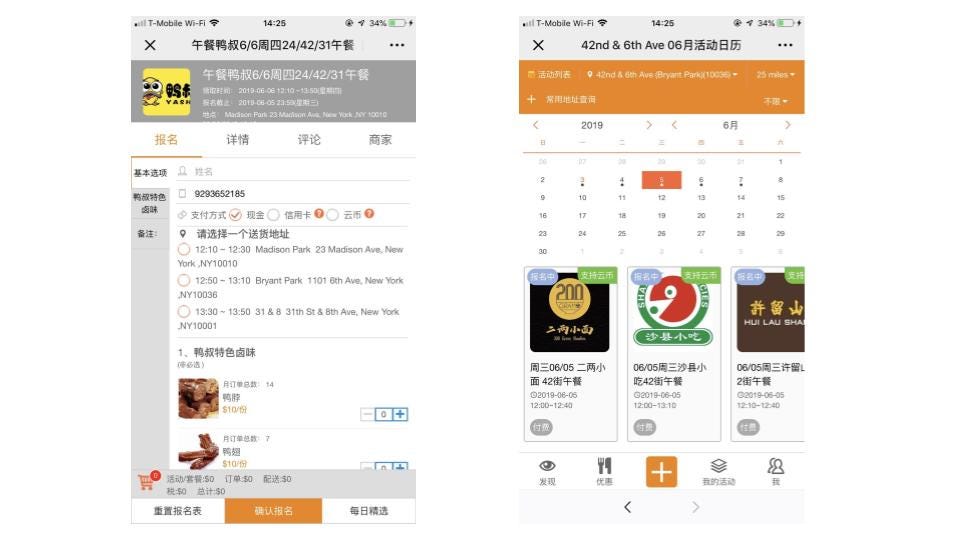This week we are giving ourselves a much-needed break. We’re publishing some of the greatest hits from early on in WITI. The good news is these pieces will be completely new to many of our audience.
Please consider upgrading to a paid sub if you haven’t yet. It helps support a daily publication of interesting subjects from around the world.
Originally published June 4, 2019.
Colin here. The lunchtime industrial complex in New York is quite a thing. Restaurants are vying to both have the on-trend health options du jour (think Sweetgreen, Little Beet, and Cava) and also process hordes of people in a timely way. Added to this, the rise of Seamless, Postmates, Caviar and Uber Eats connects each restaurant to their consumer via a delivery courier, and this off-premise business can far outweigh the money they make from diners on-premise.
I recently noticed another trend that likely sits outside of the eyes of most lunchtime orderers in New York. Chinese-born food obsessives in my office have been ordering via a Chinese language-only Wechat group, and congregating around delivery points throughout the city, like junkies looking for a specialized culinary fix. The appeal, they say, is Chinese comfort food, or jiā cháng cài (everyday food) with a reasonable price tag of $8-15 dollars. The drivers park, take pictures of their surroundings and post them to WeChat, which serves as the signal to go get your food.
Every day, around lunchtime, outside banks, department stores, and university campuses in Manhattan, you’ll see lines of young Chinese holding their phones, waiting to pick up their meals. They are not waiting for individual deliveries from Seamless, UberEATS, DoorDash, or other delivery services. More likely than not, they’ve all used Yunbanbao (云板报), translated literally as “cloud information board,” a “mini-program” found within the all-everything app WeChat, which every Chinese person has.
Why is this interesting?
A lot of the restaurants that serve the types of Chinese food that Chinese natives in New York want are, predictably, far from the neighborhoods where people are working every day. By creating an assemblage of WeChat groups based on neighborhood, bulk orders can be amassed and delivered to specific pick-up points around the city, based on demand.
It is an interesting way that a tech platform and some clever community and group workarounds are helping small businesses while scratching a taste itch for many:
Yunbanbao, unlike most food ordering apps, is a bulk-ordering service, functioning as a platform that sends multiple lunch orders to its partner restaurants, most of which are located in Flushing in Queens or Manhattan’s Chinatown. These neighborhoods have the best Chinese food, but are located far enough from major business hubs that it’s unrealistic for most office workers to commute there for lunch….
Here’s how it works: Chinese restaurants put out their delivery plans in various WeChat chat groups, each of which maxes out at 500 users (that’s WeChat’s rule, and these Yunbanbao groups fill up fast). The plans are usually in Chinese, and the groups are labeled by delivery location. Users must place their orders at least a day in advance via the Yunbanbao mini-program within WeChat, and then are given a reference number. The next day, when the restaurant minivans arrive in the pickup spots, users get their meals — without a delivery fee — using their reference numbers. They can pay via apps such as Venmo, or cash.
As a regular user of WeChat, it is interesting how many things you miss when you’re not using it in its native language. Those of us using the English language version are only scratching the surface. Here, one of the most sophisticated and powerful platforms in China (and the world) is brokering authentic Chinese food to the palates that crave it, while also providing a way for these smaller, family-owned restaurants located outside of the business center to access a huge addressable market: the hungry lunchtime hoards. It is but one example of the hacks and creativity that abound on the platform. (CJN)
Partner Post: The Daily Upside
If you love what we do with WITI, you likely value intriguing and thought-provoking stories. The Daily Upside, founded by a team of bankers and journalists, is WITI but for business news. Built with investors in mind, The Daily Upside is packed with analysis and stories you simply won’t find elsewhere. We like it as it strikes that elusive balance of gravitas and wit.
There’s a reason 200,000 readers start their day with The Daily Upside. Join today for free.
--
WITI x McKinsey:
An ongoing partnership where we highlight interesting McKinsey research, writing, and data.
Quantum computing advances. One example, a research center in Japan made a breakthrough in entangling qubits (a basic unit of information in quantum) that could make large-scale quantum computers possible. Investment is pouring in, start-ups are proliferating—but what does it mean for your organization? A new report, gives you intel on how to start strategizing.
--
Thanks for reading,
Noah (NRB) & Colin (CJN)
—
Why is this interesting? is a daily email from Noah Brier & Colin Nagy (and friends!) about interesting things. If you’ve enjoyed this edition, please consider forwarding it to a friend. If you’re reading it for the first time, consider subscribing (it’s free!).





